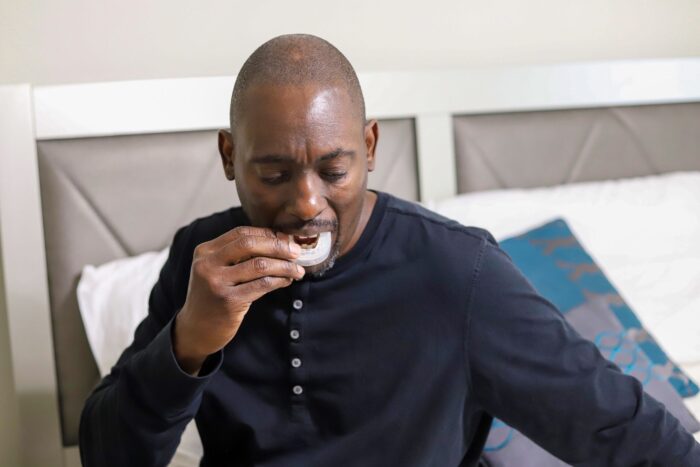Sleep apnea is a sleep disorder that affects millions of people worldwide. It occurs when the muscles at the back of the throat fail to keep the airway open during sleep, resulting in brief periods where your breathing stops. These episodes can happen multiple times in an hour and disrupt your sleep cycle. This can cause a host of health problems, including dental issues.
Sleep apnea can cause various dental problems, such as dry mouth, teeth grinding, and TMJ. Therefore, it is crucial to seek treatment for sleep apnea before it becomes a large health concern.

Dry Mouth
People with sleep apnea tend to breathe through their mouths while sleeping, decreasing saliva production. Saliva is vital to keep the mouth moist and neutralize harmful acids produced by bacteria in the mouth. The lack of saliva leads to a dry mouth. Unfortunately, this can cause tooth decay, bad breath, and gum disease.
Teeth Grinding
Sleep apnea can cause teeth grinding or bruxism, which is the clenching or grinding of teeth during sleep. Grinding can cause tooth wear, chipping, and cracking. Bruxism can also lead to sensitivity and tooth loss. Additionally, it can cause jaw pain, headaches, and muscle tension, making it hard to open and close your mouth.
TMJ Disorder
Sleep apnea can also cause TMJ, which is a condition that affects the jaw joint and muscles that control jaw movement. It can cause pain, popping or clicking noises, and limited jaw movement, making it difficult to chew or speak. TMJ disorder can also cause headaches and neck and shoulder pain, affecting your overall quality of life.
Apart from these dental issues, sleep apnea has been linked to other health problems. Some of these problems include high blood pressure, heart disease, stroke, diabetes, and depression. Hence, it is essential to seek treatment for sleep apnea to manage your dental and overall health.
Treatment Options
Treatment for sleep apnea typically involves a combination of lifestyle changes, such as losing weight, quitting smoking, and avoiding alcohol. Other methods may include using a CPAP machine to help keep the airway open during sleep. In severe cases, you may need surgery to correct issues that cause sleep apnea.
Your dentist can actually give you a solution to obstructive sleep apnea. They can create a device (oral appliance therapy) to keep your jaw aligned and your airway open.
If you suspect you have sleep apnea, it is crucial to consult with your dentist or physician to receive a proper diagnosis and treatment plan. Your dentist may recommend a sleep study to monitor your breathing patterns during sleep and determine the severity of sleep apnea.
Seeking treatment for sleep apnea can help manage these issues and improve your overall dental and systemic health. Consult with your dentist or physician to determine the best treatment plan for your sleep apnea.
